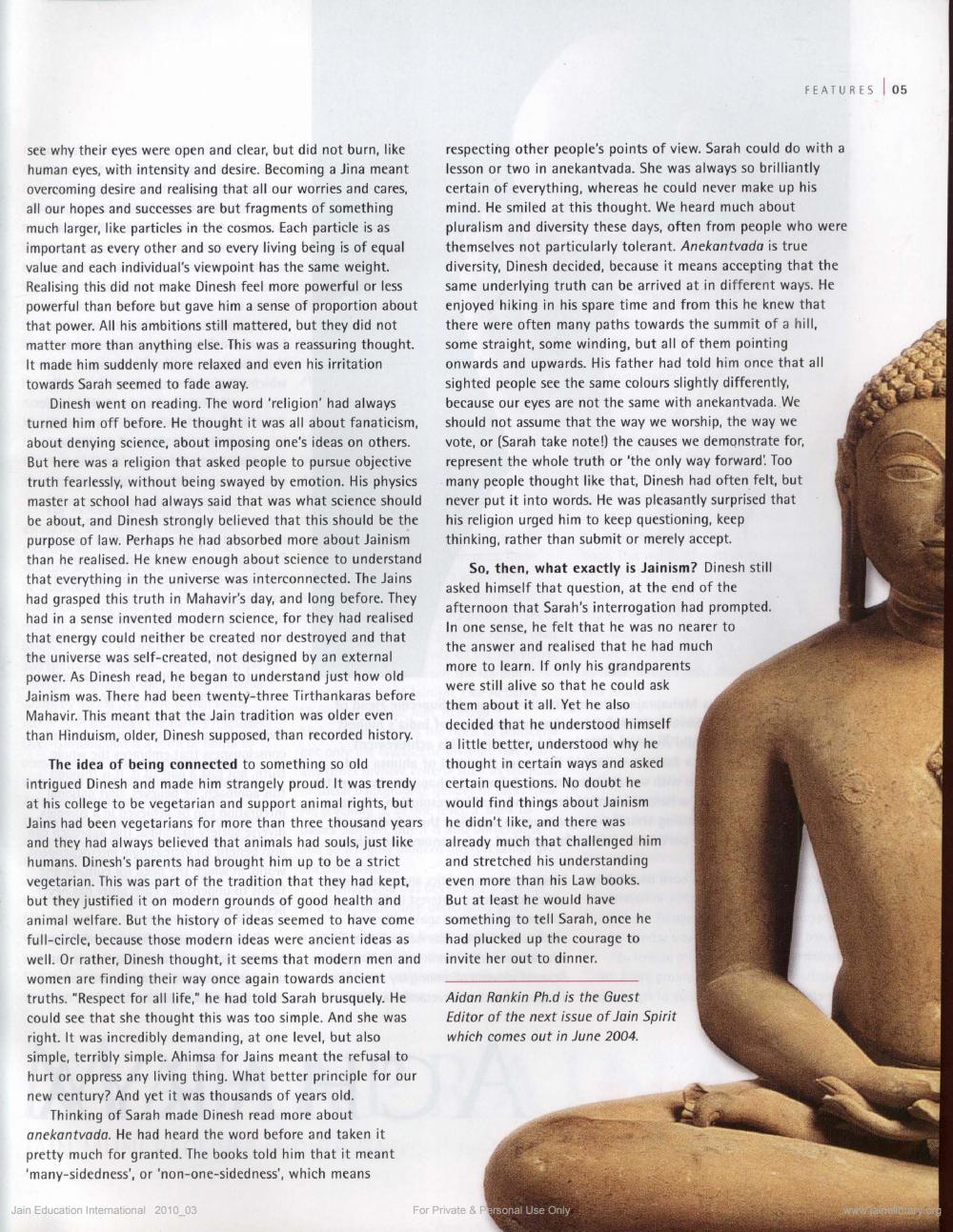Book Title: Jain Spirit 2004 03 No 18 Author(s): Jain Spirit UK Publisher: UK Young Jains View full book textPage 7
________________ see why their eyes were open and clear, but did not burn, like human eyes, with intensity and desire. Becoming a Jina meant overcoming desire and realising that all our worries and cares, all our hopes and successes are but fragments of something much larger, like particles in the cosmos. Each particle is as important as every other and so every living being is of equal value and each individual's viewpoint has the same weight. Realising this did not make Dinesh feel more powerful or less powerful than before but gave him a sense of proportion about that power. All his ambitions still mattered, but they did not matter more than anything else. This was a reassuring thought. It made him suddenly more relaxed and even his irritation towards Sarah seemed to fade away. Dinesh went on reading. The word 'religion' had always turned him off before. He thought it was all about fanaticism, about denying science, about imposing one's ideas on others. But here was a religion that asked people to pursue objective truth fearlessly, without being swayed by emotion. His physics master at school had always said that was what science should be about, and Dinesh strongly believed that this should be the purpose of law. Perhaps he had absorbed more about Jainism than he realised. He knew enough about science to understand that everything in the universe was interconnected. The Jains had grasped this truth in Mahavir's day, and long before. They had in a sense invented modern science, for they had realised that energy could neither be created nor destroyed and that the universe was self-created, not designed by an external power. As Dinesh read, he began to understand just how old Jainism was. There had been twenty-three Tirthankaras before Mahavir. This meant that the Jain tradition was older even than Hinduism, older, Dinesh supposed, than recorded history. The idea of being connected to something so old intrigued Dinesh and made him strangely proud. It was trendy at his college to be vegetarian and support animal rights, but Jains had been vegetarians for more than three thousand years and they had always believed that animals had souls, just like humans. Dinesh's parents had brought him up to be a strict vegetarian. This was part of the tradition that they had kept, but they justified it on modern grounds of good health and animal welfare. But the history of ideas seemed to have come full-circle, because those modern ideas were ancient ideas as well. Or rather, Dinesh thought, it seems that modern men and women are finding their way once again towards ancient truths. "Respect for all life," he had told Sarah brusquely. He could see that she thought this was too simple. And she was right. It was incredibly demanding, at one level, but also simple, terribly simple. Ahimsa for Jains meant the refusal to hurt or oppress any living thing. What better principle for our new century? And yet it was thousands of years old. Thinking of Sarah made Dinesh read more about anekantvada. He had heard the word before and taken it pretty much for granted. The books told him that it meant 'many-sidedness', or 'non-one-sidedness', which means Jain Education International 2010_03 respecting other people's points of view. Sarah could do with a lesson or two in anekantvada. She was always so brilliantly certain of everything, whereas he could never make up his mind. He smiled at this thought. We heard much about pluralism and diversity these days, often from people who were themselves not particularly tolerant. Anekantvada is true diversity, Dinesh decided, because it means accepting that the same underlying truth can be arrived at in different ways. He enjoyed hiking in his spare time and from this he knew that there were often many paths towards the summit of a hill, some straight, some winding, but all of them pointing onwards and upwards. His father had told him once that all sighted people see the same colours slightly differently, because our eyes are not the same with anekantvada. We should not assume that the way we worship, the way we vote, or (Sarah take note!) the causes we demonstrate for, represent the whole truth or 'the only way forward: Too many people thought like that, Dinesh had often felt, but never put it into words. He was pleasantly surprised that his religion urged him to keep questioning, keep thinking, rather than submit or merely accept. So, then, what exactly is Jainism? Dinesh still asked himself that question, at the end of the afternoon that Sarah's interrogation had prompted. In one sense, he felt that he was no nearer to the answer and realised that he had much more to learn. If only his grandparents were still alive so that he could ask them about it all. Yet he also decided that he understood himself a little better, understood why he thought in certain ways and asked certain questions. No doubt he I would find things about Jainism he didn't like, and there was already much that challenged him and stretched his understanding even more than his Law books. But at least he would have something to tell Sarah, once he had plucked up the courage to invite her out to dinner. Aidan Rankin Ph.d is the Guest Editor of the next issue of Jain Spirit which comes out in June 2004. FEATURES 05 For Private & Personal Use OnlyPage Navigation
1 ... 5 6 7 8 9 10 11 12 13 14 15 16 17 18 19 20 21 22 23 24 25 26 27 28 29 30 31 32 33 34 35 36 37 38 39 40 41 42 43 44 45 46 47 48 49 50 51 52 53 54 55 56 57 58 59 60 61 62 63 64 65 66 67 68 69 70
